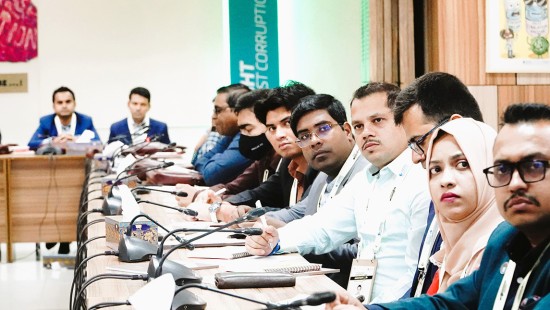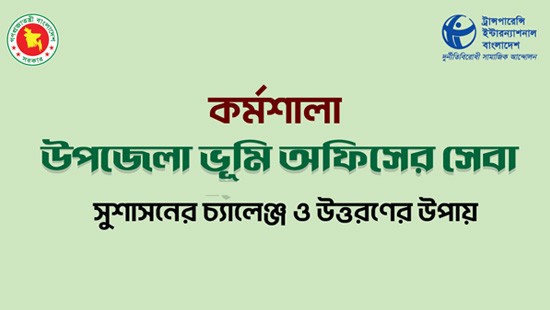Published: 24 August 2025
Forty university students of journalism discipline crowded into the computer lab of the central library, eyes wide with curiosity. On the table in front of them lay piles of colorful Lego blocks. At first glance, it looked like a simple game, but Mohammad Tauhidul Islam, Director of Outreach and Communication at Transparency International Bangladesh (TIB), had a bigger plan. As the students began building, he explained how each small piece of Lego represented a piece of data. Alone, it was just a block, but together, they could form a structure just like bits of information coming together to uncover the truth in investigative journalism. Laughter and conversation filled the room, but beneath the fun, a lesson was taking shape. Data can reveal powerful stories.
As part of its data-driven advocacy and efforts to equip emerging young journalists with data journalism skills, TIB recently organized a daylong workshop on 24 August 2025 with the active participation of 40 students from the Mass Communication and Journalism Department of Khulna University. Veteran journalists and data experts conducted the sessions, covering data-driven investigative reporting, the right to information, open data, data analysis, visualization, and more.
Data Journalism: From Numbers to Narratives
At the beginning of the workshop, Muhammad Imran, a freelance data journalist and educator, guided students through the journey from raw data to information. He explained how patterns hidden in numbers could be transformed into meaningful insights and how these insights can drive investigative reporting. He even shared his personal experiences, inspiring students to imagine their own paths in the evolving field of journalism.
Following this, Mohammad Tauhidul Islam led an engaging session on sources of data. He introduced students to the vast world of open data, demonstrated how the Right to Information Act can be used to collect reliable information, and explained practical methods to verify and organize data. Through interactive examples, he showed how journalists can turn scattered pieces of information into compelling stories that hold institutions accountable. Students actively participated, asking questions and exploring real-life scenarios, making the session highly interactive and insightful. Later, Rifat Rahman from TIB’s Outreach and Communication division guided students through hands-on exercises in data analysis and visualization. He demonstrated step-by-step how raw data could be cleaned, sorted and transformed into charts, graphs, and visual narratives. Students worked directly with sample datasets, experimenting with different techniques to identify trends and patterns. The session emphasized how visuals can make data-driven stories more impactful and understandable for readers, giving students practical skills they could immediately apply in reporting.
Each participant received a copy of TIB’s Data Journalism Handbook, a guide to navigating the practical aspects of the field. Students also practiced spreadsheet basics and data organization, learning skills they could apply both in their studies and future reporting.
Data Journalism: A Powerful Tool to Build Public Trust
Inaugural remarks added depth to the day. Md. Shariful Islam, Assistant Professor, emphasized that data is essential not only for reporting but also for research. Dean Sk. Sharafat Hossen encouraged students to use their skills ethically to uncover the truth, while Zafar Sadiq, Duty Coordinator at TIB, moderated the session.
The highlight of the inaugural session came from Vice-Chancellor Professor Rezaul Karim, who reminded students that journalism is not only a profession but also a civic duty. He emphasized that data-driven reporting can raise collective awareness against corruption and injustice, urging participants to see themselves as change makers. The Vice-Chancellor praised TIB for bringing global practices of data journalism to Khulna University and expressed hope that the knowledge gained would extend beyond classrooms to inspire positive change in society.
Dr. Iftekharuzzaman, Executive Director of TIB, highlighted data journalism as one of the most powerful tools in modern media, emphasizing that accurate, evidence-based reporting strengthens democracy and accountability. He explained that presenting information-driven stories at every level of journalism can build public trust and noted how data journalism is uncovering truths worldwide while taking root in Bangladesh. He encouraged participants to actively engage with the sessions and embrace hands-on learning to make the most of the workshop.
At the closing session, participants shared their thoughts on the workshop and expressed eagerness to learn more about data journalism techniques. Sara Monami Hossain, Discipline Head and Associate Professor of Mass Communication and Journalism, expressed her gratitude for arranging the workshop and highlighted the potential for applying the learning in the classroom. The workshop concluded with the distribution of certificates among the participants.
By the end of the day, the Lego blocks had served their purpose. Students had not only built models but also built an understanding. In the hands of a skilled journalist, data is more than numbers. It is a tool for transparency, accountability and truth. TIB’s Data Journalism Manual, gifted to the department and central library, will continue to guide these budding journalists as they embark on their journey to uncover the stories that matter.























